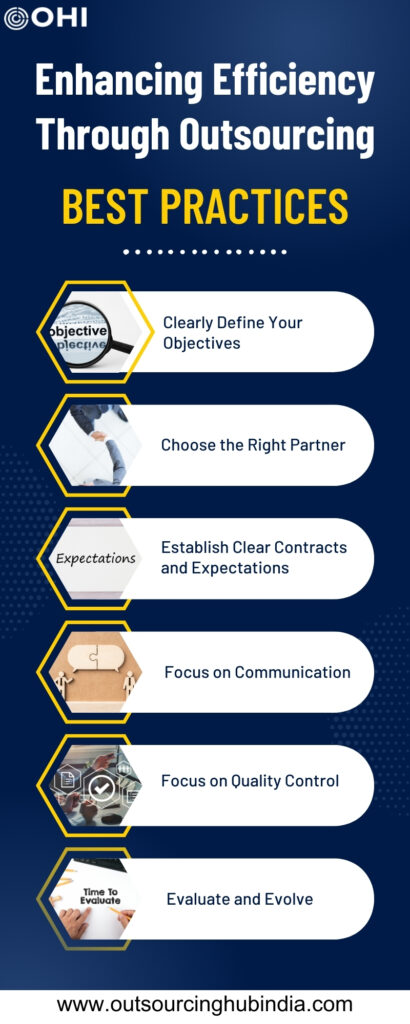
Outsourcing Best Practices: Strategies for Enhanced Operational Efficiency
- May 2, 2024
- OHI

Outsourcing has become a popular strategy for businesses looking to improve efficiency and reduce costs. By delegating tasks or services to external companies, organizations can focus on their core activities while benefiting from the expertise and capabilities of specialized service providers. However, to truly reap the benefits of accounting outsourcing, it’s essential to follow best practices that ensure smooth operations and quality outcomes. Here’s a guide to effective outsourcing that can enhance your company’s operational efficiency.
Outsourcing involves hiring third-party service providers to perform certain business functions that are traditionally handled internally. This can encompass a variety of tasks, ranging from customer support and IT assistance to production operations and financial management.. The primary goal is to streamline operations and leverage external expertise without the burden of managing non-core activities.

Before you begin outsourcing, it’s crucial to have clear goals. What do you hope to achieve by outsourcing? Are you looking to reduce costs, improve service quality, or perhaps increase flexibility? Having specific objectives will help you measure the success of your outsourcing efforts and ensure alignment with your business strategy.
The success of your outsourcing venture largely depends on the capabilities of your service provider. It’s important to conduct thorough research and select partners who not only have the necessary expertise but also share your company values and commitment to quality. Look for providers with a proven track record in your industry and check their references and case studies.
Effective communication is essential for successful outsourcing. You need to establish clear lines of communication with your outsourcing partner. Regular updates, meetings, and reports can help both parties stay aligned. Consider using collaborative tools and technologies to facilitate smooth communication across different locations and time zones.
Regular monitoring of the outsourcing provider’s performance is critical. Set up key performance indicators (KPIs) that align with your business objectives. These could include metrics related to quality, delivery times, cost savings, or customer satisfaction. Regular reviews will help you identify areas of improvement and ensure that the outsourcing partner is meeting your expectations.
Treat your outsourcing relationships as strategic partnerships rather than mere vendor arrangements. Investing time and resources in building strong relationships can lead to better collaboration and innovation. Encourage open dialogue about challenges and opportunities and seek feedback from your providers.

Business needs can change rapidly, and your outsourcing arrangements should be able to adapt accordingly. Work with your outsourcing partner to ensure that services can be scaled up or down based on demand. This flexibility can be crucial in managing costs and maintaining service levels during fluctuating market conditions.
While cost reduction is often a primary motive for outsourcing, it should not come at the expense of quality. Implement robust quality control processes to ensure that the outsourced services meet your standards. This might include regular quality audits, third-party certifications, or continuous improvement programs.
Outsourcing can expose your business to various risks, including operational, reputational, and compliance risks. Develop a risk management plan that identifies potential risks and outlines strategies to mitigate them. Ensure that your outsourcing partner has adequate security measures in place to protect your data and intellectual property.
Outsourcing strategies should not be set in stone. Regularly evaluate the outcomes of your outsourcing efforts and be open to making changes if your objectives are not being met. Continuous improvement should be a key part of your strategy, adapting to new technologies, market conditions, and business goals.
Outsourcing, when done right, can significantly enhance your company’s operational efficiency. By following these best practices, you can establish successful outsourcing partnerships that not only reduce costs but also improve service quality and business agility. Remember, the key to successful outsourcing is choosing the right partner and maintaining a strong, communicative relationship that adapts to changing business needs.
Contact us for a customized NO OBLIGATION proposal for outsourcing your accounting activities.







